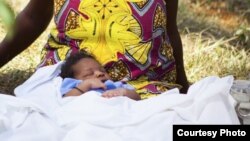A new initiative that aims to improve maternal and child health and nutrition in sub-Saharan Africa is being launched in September 2014 using digital technology. Gemalto, a digital security company, is partnering with the mobile telecommunications association called Groupe Speciale Mobile Association (GSMA).
With the cooperation of other companies including Mobile Telephone Network (MTN) and Samsung, the partners will provide support to over 15 million pregnant women and mothers with children under five years old.
Local healthcare workers will obtain vital information from mothers and mothers-to-be in each of seven targeted countries and register them for the long-term project. The moms will then receive nutrition and healthcare support through mobile technology, a service that will be provided with no cost to them.
GSMA’s Mobile for Development mHealth program also known as (PAMI) announced the launch of the new cross-ecosystem partnership that will provide nutritional support and child healthcare for hard to reach population groups in sub-Saharan Africa.
The new partnership means greater access to healthcare for pregnant moms and women across Africa.
“We know that there’s a huge penetration of mobile across Africa,” says Craig Friderich, director of health at GSMA in Cape Town, South Africa, “but we also understand that a lot of the very vulnerable women don’t have access to those phones. We know that the access is likely through someone in their household or family members.
“So, we’ve tried to make sure that the services will be available across all handsets and across all mobile channels. And by that we mean SMS….so really stretching across the continuum of basic phone, through to feature phone, and then on to the higher end smartphones,” says Friderich.
Smart messages give greater phone access
Smart message service is an ambitious undertaking that will work in African countries, says one of the partners.
“The smart message service is an interactive messaging solution which uses SMS as a barrier creating a…user interface,” says Jeremy Osborne, Gemalto’s business development director. “An important part is that this runs on all handsets because it’s based on the SIM card itself. What this means is you now have a tool that is very convenient to use for either surveys or promoting services.
“So in a case like this, you could use a tool like this to provide very effective access to mHealth services, or gain insight from the population on mHealth or related matters,” says Osborne.
In addition, Friderich says the services are predicated on working with partners in each of the targeted sub-Saharan African countries: Ivory Coast, Ghana, Nigeria, Rwanda, South Africa, Uganda, and Zambia. The launch is scheduled for this coming September.
Simplicity for the end-user is paramount, says Friderich. “We work with local health authorities and regulated and health providers to make sure that the content and services that vulnerable women and children will be receiving are contextualized, localized, and available in their given language of choice.
“Essentially, what we’ve seen in the industry is that the price and availability of services is not what it should be, and so we’ve managed to secure the commitments of MTN, Samsung, Gemalto and other partners to effectively make these services free of charge to the end-user.”
Gemalto’s Osborne says they are delighted to be able to see how their technology is being used in Africa to provide vital services for African women and children.
“We have such a strong presence in Africa thanks to the numerous mobile operators that procure services from us - SIM cards and services and such,” says Osborne. “So that puts us in a wonderful position to really assist the operators and all the members of this initiative to really deploy a broad range of mobile health services.”




